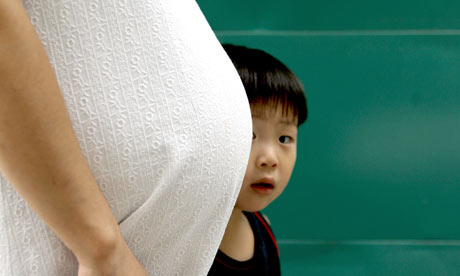
Women who drink alcohol while they are pregnant may be harming the fertility of their unborn sons, researchers say.
Expecting mothers who consumed more than 4.5 alcoholic drinks a week were more likely to have sons with lower sperm counts than those who drank little or none at all, their study suggests.
Men whose mothers drank the most had sperm counts a third lower on average than those whose mothers hardly drank in pregnancy or completely abstained.
It is too early to say whether a mother's alcohol consumption directly harms her son's future sperm count, but the finding might go some way towards explaining why sperm quality has declined in recent decades, the researchers said. The findings were announced at a meeting of the European Society of Human Reproduction and Embryology in Rome today.
The government advises pregnant women to avoid alcohol completely during pregnancy, though the Royal College of Obstetricians and Gynaecologists says there is no evidence that a couple of units of alcohol once or twice a week will harm an unborn baby.
When a pregnant woman drinks beer, wine or spirits, the level of alcohol in her baby's blood rises as much as in her own. Because babies have under-developed livers, they are unable to break the alcohol down as quickly, and so are exposed to high levels for longer.
Unborn babies that are continually exposed to high levels of alcohol can develop foetal alcohol syndrome, a developmental disorder that causes learning difficulties and growth abnormalities.
Doctors at Aarhus University Hospital in Denmark investigated 347 men aged between 18 and 21 years old whose mothers had been recruited to the Danish "Healthy habits for two" study between 1984 and 1987. Towards the end of their pregnancy, the women answered a lifestyle questionnaire that included a question about alcohol consumption. Their grown-up sons gave blood and semen samples for analysis.
Cecilia Ramlau-Hansen, who led the study, divided the men into four groups depending on how much alcohol their mothers drank while pregnant. Mothers of men in the first group had less than one alcoholic drink a week; the second group had one to 1.5 drinks a week; the third consumed between two and four drinks; and the fourth group had 4.5 or more drinks per week.
The study showed that the sons of mothers who drank 4.5 or more drinks a week had an average sperm count of 25m per millilitre, compared with 40m per millilitre for those who were least exposed to alcohol in the womb. The World Health Organisation defines a normal sperm count as 20m per millilitre or more.
"The reduced sperm concentrations in the most exposed men are rather close to the lower end of the WHO's normal range for fertility," said Dr Ramlau-Hansen. The chances of conceiving increase with greater sperm count, up to around 40m per millilitre, so "it is possible that the most exposed men could be less fertile than the least exposed," she added.
Young men whose mothers say they drank between one and 1.5 drinks per week during pregnancy produced the most semen and had the highest total sperm counts in the study. The researchers say they're unsure whether this is a statistical anomaly caused by inaccuracies in the mothers' answers, or a genuine beneficial effect of small amounts of alcohol in pregnancy.
The fathers' alcohol consumption had no bearing on their sons' sperm quality.
"If further research shows that maternal alcohol consumption is a cause of reduced semen concentration in male offspring, then we are a bit closer to an explanation of why semen quality may have decreased during the last decadees and why it differs between populations," said Ramlau-Hansen.
Allan Pacey, a senior lecturer in andrology at Sheffield University, said: "The most critical time for testicular development seems to be when the male foetus is in the womb. It may be that alcohol affects that development, but this study doesn't prove that. It makes sense, but it could also be something related to alcohol consumption."

